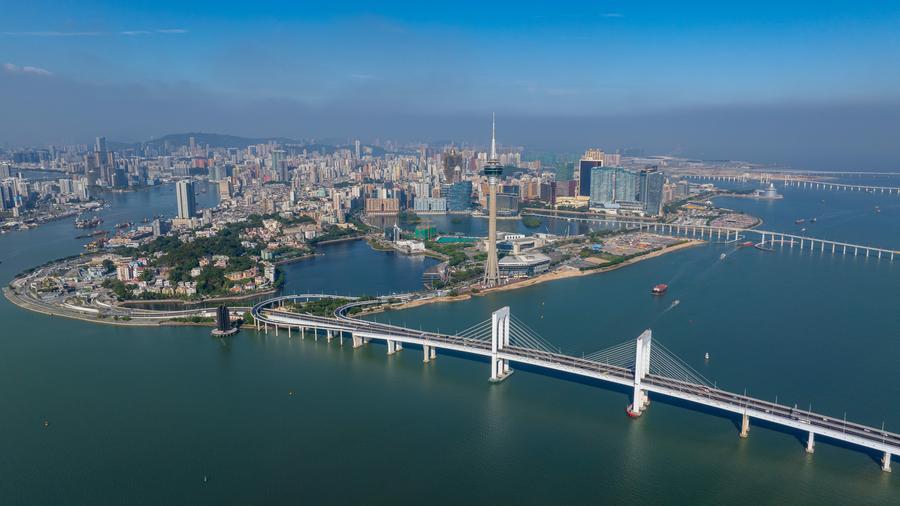
 0 Comment(s)
0 Comment(s) Print
Print E-mail Xinhua, December 20, 2024
E-mail Xinhua, December 20, 2024

An aerial drone photo taken on Dec. 11, 2024 shows a view of the Macao Peninsula in south China. [Photo/Xinhua]
The 25th anniversary of Macao's return to the motherland stands as yet another occasion to observe the practical success and institutional strengths of China's "one country, two systems" policy, which has brought enduring stability and prosperity to the region.
Over the past quarter century, the practice of "one country, two systems" with Macao characteristics has garnered global recognition for its success, and demonstrated great vitality and unique charm.
In stark contrast to sluggish development and poor public security before Macao's return to the motherland in 1999, the Macao Special Administrative Region (SAR) has witnessed rapid socioeconomic development and substantial improvement in people's living standards.
From 1999 to 2023, Macao's per capita GDP more than quadrupled to around 69,000 U.S. dollars. On Forbes magazine's 2024 list of the world's richest places, Macao ranked first in Asia and second globally. It is also one of the safest cities in the world. The region has seen historic achievements in economic and social development, and Macao residents' sense of gain, happiness and security has been constantly enhanced.
The region is also unleashing new development potential and vitality. It has made preliminary progress in the appropriate diversification of its economy, fostering key industries such as modern financing and the high-tech sector. From 2019 to 2023, the gaming industry's share of the region's GDP fell 14 percentage points to 37.2 percent. The regional economy is thus becoming more robust and vibrant.
The prosperity and stability of the Macao SAR are solid proof that the "one country, two systems" policy serves the fundamental interests of Macao and the whole country. Residents of Macao have consistently shown a high level of confidence in this policy.
In the early 1980s, then Chinese leader Deng Xiaoping put forward the concept of "one country, two systems" with the aim of realizing the peaceful reunification of the nation. According to Deng, the concept means there is only one China and under this premise, the mainland adheres to the socialist system while Hong Kong, Macao and Taiwan may retain their capitalist systems over a long time to come.
Under the "one country, two systems" policy, the SAR enjoys executive, legislative and independent judicial power, including that of final adjudication. The people of Macao administer Macao, with a high degree of autonomy. Its capitalist system and way of life remain unchanged.
As a case in point, the gaming industry, which is banned on the mainland, continues to be a pillar of Macao's economy. Residents of Macao now enjoy a wider range of rights and freedoms than at any other time in history.
"One country, two systems" is a great innovation in the practice of politics, providing the international community with a Chinese solution to similar problems. With no precedent to follow and no ready-made experience to draw upon, the central government has led the governments of the Hong Kong and Macao SARs, as well as all sectors of society, to actively explore this new path and move forward with firm steps. Hong Kong and Macao have integrated themselves into overall national development, and embarked on a bright path of mutual complementarity and common development with the mainland.
Thanks to the policy, Macao has also become a window for China's opening up to the world. The World Trade Organization recognizes Macao as one of the most open economies in the world for trade and investment. It has maintained its status as a separate customs territory and a free port, and played a unique role in promoting economic cooperation and cultural exchanges between China and Portuguese-speaking countries.
The central government has significantly increased the SAR's land and maritime areas to bolster its development. Cooperative mechanisms and infrastructure -- such as the Guangdong-Hong Kong-Macao Greater Bay Area, the Hong Kong-Zhuhai-Macao Bridge, and the Guangdong-Macao In-Depth Cooperation Zone in Hengqin -- have provided Macao with ample development headroom and rich opportunities.
Macao's current prosperity and stability show China's capability of encompassing two social systems within one country. The "one country, two systems" policy has proved to be the best institutional arrangement to ensure Macao's sustained prosperity and stability.
With the full support of the motherland, Macao has overcome various challenges and maintained good momentum in its long-term, stable development.
As China adheres to and improves its implementation of the "one country, two systems" policy, Macao will write new chapters in its success story. Further success of the policy will play a key role in realizing China's full reunification and national rejuvenation, and contribute more to world peace and development.